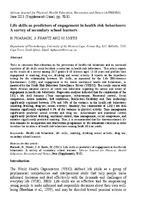| dc.contributor.author | Pharaoh, Hamilton | |
| dc.contributor.author | Frantz, Jose M. | |
| dc.contributor.author | Smith, Mario | |
| dc.date.accessioned | 2014-10-26T20:06:09Z | |
| dc.date.available | 2014-10-26T20:06:09Z | |
| dc.date.issued | 2011 | |
| dc.identifier.citation | Pharaoh, H., Frantz, J.M. & Smith, M. (2011). Life skills as predictors of engagement in health risk behaviours: a survey of secondary school learners. African Journal for Physical, Health Education, Recreation and Dance, June Supplement, 70-81 | en_US |
| dc.identifier.issn | 1117-4315 | |
| dc.identifier.uri | http://hdl.handle.net/10566/1277 | |
| dc.description.abstract | There is consensus that education on the prevention of health risk behaviour and an increased repertoire of life skills could facilitate a reduction in health risk behaviours. This article reports on the results of a survey among 1027 grades 8-10 learners aged 13-18 years and profiles their engagement in smoking, drug use, drinking and sexual activity. It reports on the hypothesis testing for the relationship between life skills, as measured by the Life Effectiveness Questionnaire (LEQ), and engagement in the above mentioned health risk behaviours, as measured by the Youth Risk Behaviour Surveillance Survey (YRBSS). The results concur with South African national surveys of youth risk behaviour regarding the nature and extent of engagement in health risk behaviours. Regression analyses indicated that the combination of the LEQ`s life skill domains (Time management, Achievement, Emotional control, Social competence, Active initiative, Self confidence, Intellectual flexibility and Task leadership) significantly explained between 25% and 56% of the variance in the health risk behaviours (smoking, drinking, drug use, sexual activity). Similarly, this combination of LEQ`s life skill domains significantly explained 4.1% of the variance in physical activity. Time management significantly predicted sexual activity and drug use. Achievement and emotional control significantly predicted drinking, emotional control, time management, social competence, and initiative significantly predicted smoking. Thus, it is recommended that the abovementioned life skill domains be incorporated into intervention programmes or life orientation curricula in order to reduce the incidence of health risk behaviours among South African youth. | en_US |
| dc.language.iso | en | en_US |
| dc.publisher | LAM Publications Limited | en_US |
| dc.rights | Copyright LAM Publications Limited. Publisher granted permission for inclusion of the published file in the Repository. | |
| dc.subject | Health risk behaviour | en_US |
| dc.subject | Life skills | en_US |
| dc.subject | Smoking | en_US |
| dc.subject | Drinking sexual activity | en_US |
| dc.subject | Drug use | en_US |
| dc.subject | Secondary school learners | en_US |
| dc.title | Life skills as predictors of engagement in health risk behaviours: a survey of secondary school learners | en_US |
| dc.type | Article | en_US |
| dc.privacy.showsubmitter | false | |
| dc.status.ispeerreviewed | true | |
| dc.description.accreditation | Department of HE and Training approved list | en_US |

